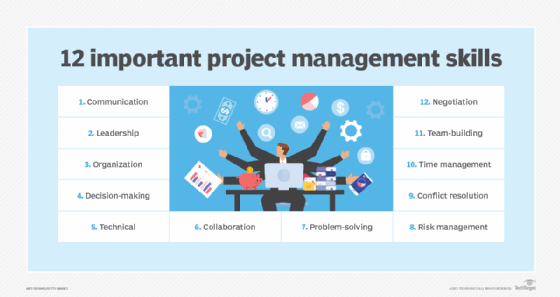
This article will cover the requirements for a career in project management. You should also consider other details, including the salary. A degree in Project Management can be a great option for anyone interested in this field. This career path has many advantages and is one of fastest growing. Continue reading !... for more information. Happy Career Hunting!
Job description
An effective career in project managing requires strategic awareness, the ability connect the customer's needs to the company’s future vision, as well as the ability of leading cross-functional teams. You'll need to have your own business goals and be able influence company strategy and get buy in from stakeholders. In addition to delivering tangible results, you will also be expected as a project manager. Project managers are product visionaries and must ensure that resources and time are aligned with company goals and KPIs.

Project managers can work in various industries such as the healthcare, IT, marketing, and insurance. Managers of project teams can work in small and large organizations. A project manager should be proficient in project management, be able and able to manage pressure well, and possess a rational mindset.
Salary
A career as a project manager offers many benefits, including increased compensation. Project managers organize and shepherd a range of projects to completion. They must ensure that projects are completed on time and on budget. The salary of a project manager can vary greatly depending on the area of responsibility, but the job description and duties are similar in most locations. A project manager may want to be considered for an executive post or start a company.
Depending on the industry they work in, project managers could also rise to higher-ranking executive positions. Many high-level positions require project management experience. In addition, executives need strong business acumen and experience in leading teams. An MBA in this field can help you develop these skills and increase your income. A career as a project manager is not for everyone. However, salaries for project managers can vary considerably based on experience and the field.
Education is required
Project managers are responsible for overseeing the whole project and not just managing the details. Project managers don't have to be experts in all areas. However, they should be skilled in managing different aspects of a given project. This career path can be chosen by either new graduates or those with extensive work experience. No matter your experience level, a bachelor's degree is required to pursue this career path.

If you want to start your career as a project manager, you may want to consider getting an undergraduate degree in business or a related subject. This will provide you with the experience and knowledge necessary to successfully manage a project. For those who are interested in project management in a larger scale, a graduate diploma may be necessary. You'll also be prepared to assume high-level leadership roles and take on responsibilities related to large projects.
FAQ
What is Six Sigma and how can it help you?
It is a way to improve quality that places emphasis on customer service and continuous learning. This is an approach to quality improvement that uses statistical techniques to eliminate defects.
Motorola developed Six Sigma in 1986 to help improve its manufacturing processes.
The idea spread quickly in the industry. Today many organizations use six-sigma techniques to improve product design.
What are the five management methods?
The five stages of a business include planning, execution (monitoring), review, evaluation, and review.
Setting goals for the future requires planning. This includes setting goals for the future and defining what you want.
Execution happens when you actually do the plan. It is important to ensure that everyone follows the plans.
Monitoring is the process of evaluating your progress toward achieving your objectives. Regular reviews of performance against targets, budgets, and other goals should be part.
Each year, reviews are held at the end. They provide an opportunity to assess whether everything went well during the year. If not, then it may be possible to make adjustments in order to improve performance next time.
After the annual review, evaluation takes place. It helps to identify what went well and what didn’t. It also provides feedback on the performance of people.
What is the difference in Six Sigma and TQM?
The major difference between the two tools for quality management is that six Sigma focuses on eliminating defect while total quality control (TQM), on improving processes and decreasing costs.
Six Sigma can be described as a strategy for continuous improvement. This method emphasizes eliminating defects using statistical methods such p-charts, control charts, and Pareto analysis.
This method attempts to reduce variations in product output. This is accomplished by identifying the root cause of problems and fixing them.
Total quality management involves measuring and monitoring all aspects of the organization. This includes training employees to improve their performance.
It is frequently used as an approach to increasing productivity.
Statistics
- This field is expected to grow about 7% by 2028, a bit faster than the national average for job growth. (wgu.edu)
- As of 2020, personal bankers or tellers make an average of $32,620 per year, according to the BLS. (wgu.edu)
- The profession is expected to grow 7% by 2028, a bit faster than the national average. (wgu.edu)
- The BLS says that financial services jobs like banking are expected to grow 4% by 2030, about as fast as the national average. (wgu.edu)
- Our program is 100% engineered for your success. (online.uc.edu)
External Links
How To
What are the 5S for the workplace?
Your first step in making your workplace more efficient and productive is to organize everything. A clean desk, a tidy room, and a well-organized workspace help everyone stay productive. The five S's, Sort, Shine. Sweep. Separate. and Store, work together to make sure that every inch of space can be used efficiently and effectively. In this session, we'll go through these steps one at a time and see how they can be implemented in any type of environment.
-
Sort. Clear away clutter and paper so that you don’t spend time looking for it. This means you place items where you will use them the most. You should keep it close to the area where you research or look up information. You should also consider whether you really need to keep something around -- if it doesn't serve a useful function, get rid of it!
-
Shine. Do not keep anything that could possibly cause damage or injury to others. It is possible to have too many pens around and not be able to safely store them. It might mean investing in a pen holder, which is a great investment because you won't lose pens anymore.
-
Sweep. Clean off surfaces regularly to prevent dirt from building up on your furniture and other items. A dusting machine is a great investment to keep your surfaces clean. To keep your workspace tidy, you could even designate a particular area for dusting and cleaning.
-
Separate. When you are ready to dispose off your trash, it is a good idea to separate it into bins. You can dispose of your garbage easily by placing trash cans strategically around the office. You can take advantage of this location and place trash bags near each bin to make it easy to find what you are looking for.